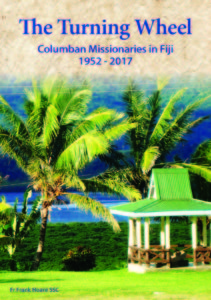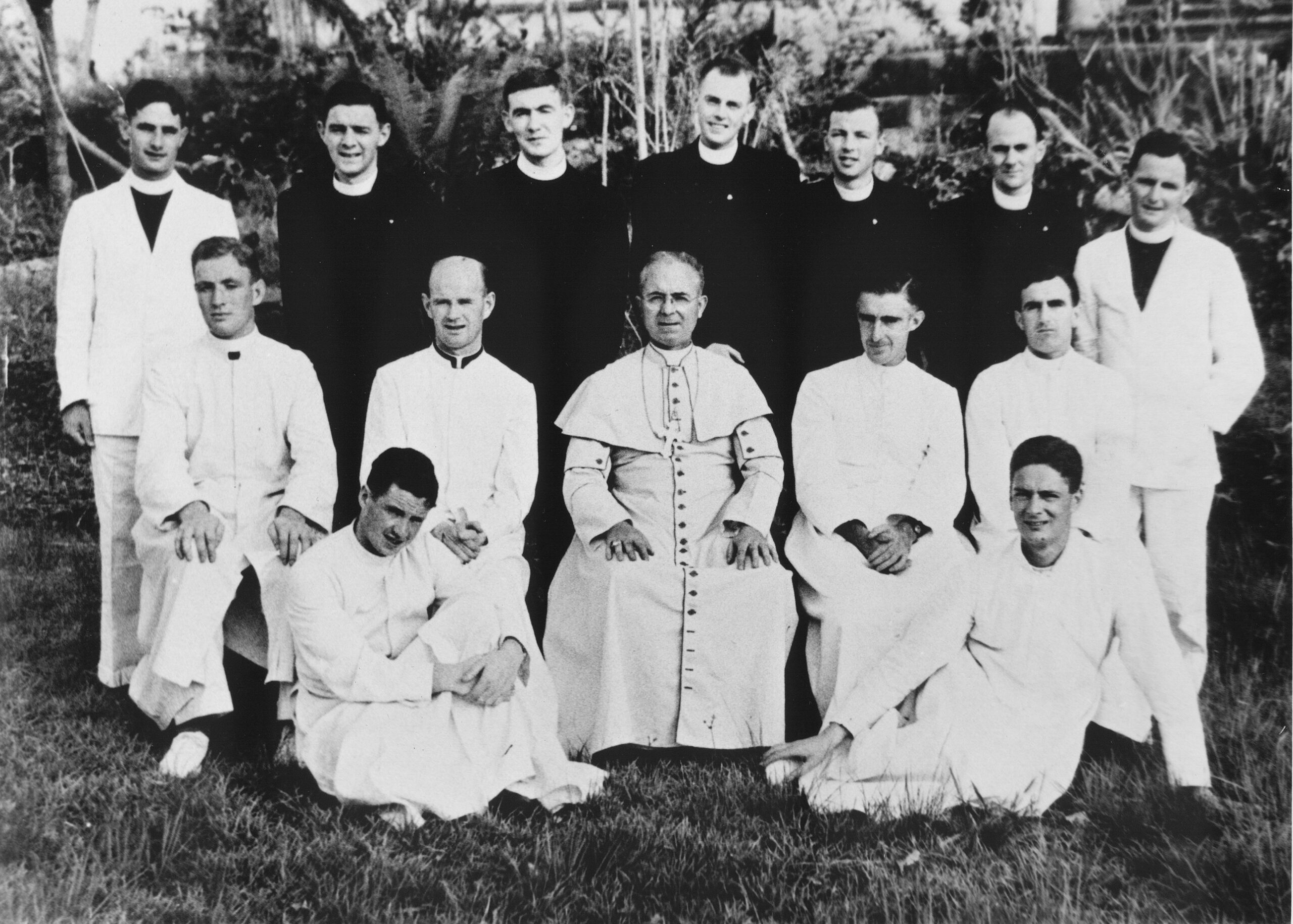Fr Frank Hoare recalls the arrival of the first Columban missionaries in Fiji 70 years ago this month and highlights some of the challenges missionaries faced in adapting to a new culture.
Thirteen young Columban priests arrived in a hot, humid, and hurricane-ravaged Suva, capital of Fiji, seventy years ago on 22 February 1952. They were given a very impressive traditional Fijian welcome. A few days later they were packed on a bus and sent on the six-hour journey to a town called Ba to begin learning the local languages.
Fr Martin Dobey remembered the enthusiasm. “We had a great journey. We sang on the bus all the way around…I myself got bus sickness. To make things worse my hat flew off and I had to stop the bus to go back and collect it.”

Fr Martin Dobey
Language
Foreign languages are a mine field. Fr Dermot Hurley, the pastor Ba Parish, had to organise a Mass for the coronation of Queen Elizabeth in the middle of 1953. He chose Fr PJ Kelly, who was considered the expert, to say the Mass in Fijian. Fr Dermot recalled, “He did a very good job. But when it came to the last words of his sermon, they went something like this: ‘So then let us rejoice and be happy on this wonderful day, this glorious and joyful day, the day of the burial of our queen.’ The word for coronation in Fijian is ‘veibuli’ but PJ said ‘veibulu’ which is Fijian for burial. The old catechist Valerio had a big laugh when he recounted the story to me…”
Language learning was particularly difficult for older missionaries who arrived later. Fr Paddy Laffan, a former missionary to China who arrived in Fiji in 1960 at the age of 62 years, was in the Yasawa Islands trying to learn Fijian in 1961. He found it difficult there without milk, so he bought a cow and kept it in a fenced enclosure. The cow got out one day and Fr Paddy demanded, in English, from a little girl to know who was responsible. The little girl said “Ko yau, saka” (it was I, Sir). “Then you tell Ko yau that I want to see him,” replied Paddy.
Culture
Figuring out and adapting to a new culture was important too. Fr John Doyle was appointed Parish Priest of a rural Fijian parish even though he had been studying Hindi, not Fijian, language. “Nobody wanted to see the two assistant priests who had spent six months learning Fijian; they wanted to see the boss. For me it was a blessing in a way. Very early on, an old man came up to me and spoke for half an hour.
I asked Fr JJ O’Loughlin, who was listening, what he had said and J.J. told me in one sentence. ‘But that man has been talking for half an hour,’ I said. ‘Yes, but he had to get himself settled,’ answered JJ. Apparently, he had prepared his approach very carefully. His request only came in the last sentence. That was a great lesson in Fijian culture for me.
If, when a Fijian walks in the door, you ask him before he even sits down what he wants, you kill him dead. He has worked out in his mind how he is going to approach this problem so as to make the request as painless, diplomatic, and gracious as possible. Fijians can teach us lessons in graciousness and tact, especially in their Fijian ceremonies and in their requests.”

Fr John Doyle with two parishioners.
Fr John later organised his parishioners to build a school dormitory. “We would load the timber on a truck once we reached the road. The Indian driver would sometimes complain about the weight of the timber being loaded on the truck. Then you would hear some smart alec say, ‘Me moku o Mitau [Let’s beat up the driver]’. The driver would be sufficiently intimidated then to proceed. Going up the hill to our location the truck would rear up with the excess weight of the long planks. Three or four youths would sit on the bonnet of the truck to keep the front wheels on the ground. It was dangerous.” This was another aspect of Fijian culture.
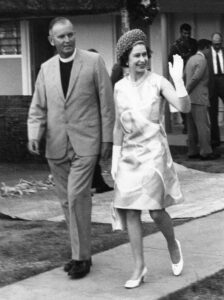
Fr Dermot Hurley with Queen Elizabeth II.
Like most Columban missionaries in Fiji, Fr Vince McCarthy came from an individualist culture with a democratic and egalitarian outlook. A Fijian man came to speak to him one day while he was sitting on a chair on the verandah of Nabala presbytery. Fr Vince offered him another chair but, in normal Fijian style, the visitor sat on the floor.
Fr Vince repeatedly asked him to sit opposite him on the chair but to no effect. Finally, he went over to his visitor and physically lifted him into the chair! When telling the story later, Fr Vince winced as he said, “I could have satisfied my American democratic instincts by just sitting on the floor myself!”
Creative Responses to Frustrations
One of the sources of frustrations for the Columbans in the early years was the bishop as Fr Martin Dobey recalled. “He issued a lot of petty edicts about our daily lives. You couldn’t leave your parish without his permission or spend one night outside your parish without his permission. One day he was sitting in the little sitting room in Lautoka parish in bad form when [Fr] Arthur Tierney (from a parish miles away) comes roaring into the yard on his motorbike and stops within a half-inch of the step of the back door.
He gets off with great éclat. Bishop Foley looks up at him coldly and says, ‘Father, what are you doing out of your parish today?’ ‘Oh, I’ve just come down for confession, my Lord.’ [Bishop] Foley was completely nonplussed. He couldn’t reply. It might or might not be true. So, he went into his room and sulked for four hours.
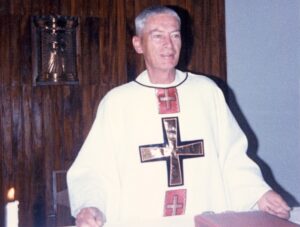
Fr Arthur Tierney
Fr Arthur and the Bishop had a further run in at another time. “He received complaints about Arthur being downtown in Suva city all the time and not in his parish of Sabula. So, he issued orders to Arthur not to go into Suva without his permission. Half an hour later the bishop gets a call from Arthur for permission to get groceries from Morris Heston.”
“Half an hour after that, he received a call for permission to buy some vegetables from the market. Arthur did five or six of these calls and Bishop Foley at last said, ‘Go to hell!’ That was the end of that edict.”
Missionary experience keep you humble. It is also a great teacher. St Columban, missionary to Europe almost 1400 years ago and patron of the Missionary Society of St Columban said, “A life unlike your own can be your teacher.” If the challenges and frustrations sometimes weighs you down the joys, surprises and fun compensate for them.
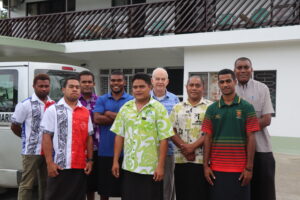
Fr Frank Hoare with the Fijian Formation group in 2019.
Fr Frank Hoare is from Portlaoise. He was ordained in 1973 and sent on mission to Fiji. He has done studies in psychology, anthropology and pastoral theology. Until recently he acted as vocations director for the Columbans in Fiji and Vicar for Teaching in the Archdiocese of Suva. He wrote a history of the Columbans in Fiji. The Turning Wheel traces the changes that happened in Fiji and in the Catholic Church over 65 years from 1952 up to 2017. It can be purchased here: https://columbans.ie/product/the-turning-wheel
